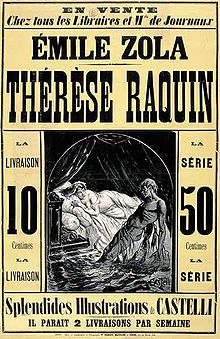Emile Zola, Thérèse Raquin《苔蕾斯·拉甘》1867 / 1873
"Thérèse Raquin" is Emile Zola's novel that revolves around adultery and murder. This novel tells the story of a young woman who was unhappily married to her first cousin living with her overbearing aunt.
Zola describes this piece as the "study temperaments and not characters." Because of this novel, the author was considered as an example of naturalism.
His novel was later adapted as a play in 1873, which he also wrote. The story has since been made into films, mini-series, musicals, and more.
"They turned me into a hypocrite and a liar. They stifled me with their bourgeois comfort and I don't understand why there is any red blood left in my veins. I would lower my eyes and put on a sad, imbecilic face like them, leading the same dead life. [...] they had turned me into a docile creature with their weak kindness and their repulsive tenderness. So I lied, and I kept on lying. I stayed there, sweet and silent, dreaming about how I could hit and bite." - Emile Zola, 'Therese Raquin'
| Thérèse Raquin | |
|---|---|
 | |
| Written by | Émile Zola |
| Date premiered | 1867 / 1873 |
| Original language | French |
| Genre | Naturalism, theatrical naturalism, psychological novel |
左拉與自然主義思潮
自然主義的誕生
1857年,哲學家泰納在《批評和歷史論文集》中首先為文學上的自然主義下了定義,即以來觀察,用科學方法描寫生活。左拉接受了泰納的美學理論。他還閱讀了法國醫生呂卡斯的《自然遺傳的哲學和生理學論著》、勒圖爾諾醫生的《情慾生理學》、達爾文的《物種起源》等生物、遺傳學著作,逐漸形成了一整套自然主義的文學主張。

沒有留言:
張貼留言
注意:只有此網誌的成員可以留言。